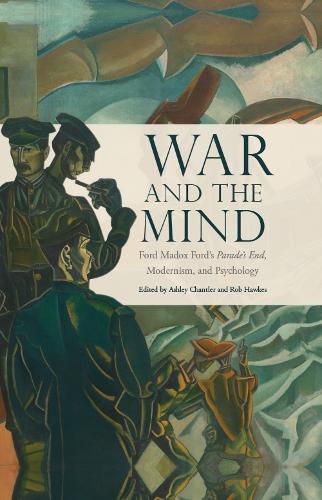Readings Newsletter
Become a Readings Member to make your shopping experience even easier.
Sign in or sign up for free!
You’re not far away from qualifying for FREE standard shipping within Australia
You’ve qualified for FREE standard shipping within Australia
The cart is loading…






New critical essays illuminate Ford Madox Ford’s epic First World War modernist masterpiece, Parade’s End
This is the first full-length critical study of Parade’s End to focus on the psychological effects of the war. Originally published in 4 volumes between 1924 and 1928, Parade’s End has been described as “the finest novel about the First World War’ (Anthony Burgess), "the greatest war novel ever written by an Englishman’ (Samuel Hynes), "a central Modernist novel of the 1920s, in which it is exemplary’ (Malcolm Bradbury), and "possibly the greatest 20th-century novel in English’ (John N. Gray).
These 10 newly commissioned essays focus on the psychological effects of the war, both upon Ford himself and upon his novel: its characters, its themes and its form. The chapters explore: Ford’s pioneering analysis of war trauma, trauma theory, shell shock, memory and repression, insomnia, empathy, therapy, literary Impressionism and literary style. Writers discussed alongside Ford include Joseph Conrad, Siegfried Sassoon, May Sinclair, and Rebecca West, as well as theorists Deleuze and Guattari, Michel Foucault, Sigmund Freud, William James, and W. H. R. Rivers.
Key Features
A long-overdue examination of Ford’s First World War modernist masterpiece Parade’s End
Focuses on psychology and the effects of war on the minds of those who fought and those at home
Adds to writing about First World War writers, war trauma and trauma theory, as well as modernism and literary Impressionism
Contributes to the burgeoning field of medical humanities by reconsidering Parade’s End in terms of the various mental and psychological disorders represented within the novel
Ashley Chantler is Senior Lecturer in English at the University of Chester.
Rob Hawkes is Senior Lecturer in English at Teesside University.
$9.00 standard shipping within Australia
FREE standard shipping within Australia for orders over $100.00
Express & International shipping calculated at checkout
New critical essays illuminate Ford Madox Ford’s epic First World War modernist masterpiece, Parade’s End
This is the first full-length critical study of Parade’s End to focus on the psychological effects of the war. Originally published in 4 volumes between 1924 and 1928, Parade’s End has been described as “the finest novel about the First World War’ (Anthony Burgess), "the greatest war novel ever written by an Englishman’ (Samuel Hynes), "a central Modernist novel of the 1920s, in which it is exemplary’ (Malcolm Bradbury), and "possibly the greatest 20th-century novel in English’ (John N. Gray).
These 10 newly commissioned essays focus on the psychological effects of the war, both upon Ford himself and upon his novel: its characters, its themes and its form. The chapters explore: Ford’s pioneering analysis of war trauma, trauma theory, shell shock, memory and repression, insomnia, empathy, therapy, literary Impressionism and literary style. Writers discussed alongside Ford include Joseph Conrad, Siegfried Sassoon, May Sinclair, and Rebecca West, as well as theorists Deleuze and Guattari, Michel Foucault, Sigmund Freud, William James, and W. H. R. Rivers.
Key Features
A long-overdue examination of Ford’s First World War modernist masterpiece Parade’s End
Focuses on psychology and the effects of war on the minds of those who fought and those at home
Adds to writing about First World War writers, war trauma and trauma theory, as well as modernism and literary Impressionism
Contributes to the burgeoning field of medical humanities by reconsidering Parade’s End in terms of the various mental and psychological disorders represented within the novel
Ashley Chantler is Senior Lecturer in English at the University of Chester.
Rob Hawkes is Senior Lecturer in English at Teesside University.